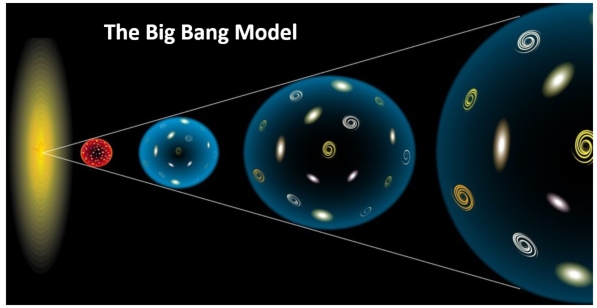The Big Bang Theory is the term used to describe a possible model of the evolution of the universe that began with a single, super-dense point that suddenly expanded, approximately 13.7 billion years ago and has been expanding ever since. The theory is an attempt to explain what happened at the beginning of spacetime dealing with the first fraction of a second of creation. Furthermore, the Big Bang theory states that space and time did not exist until the singularity expanded.
Origins of the Big Bang Theory
The Big Bang theory was first postulated by a Belgian priest named Georges Lemaitre in 1927.1 Soon after, Edwin Hubble (1889-1953) observed in 1929 that the galaxies are moving away in all directions. Logically, if they are moving away from each other, then they had to have a starting place.
Evidence of the Big Bang
The evidences of the big bang are several.2
- Radio astronomers have observed what they call the cosmic microwave background radiation (1964) which is a way of detecting the leftover heat from the Big Bang expansion.
- Redshift of the galaxies. This means that as galaxies move away, the light frequency from them moves towards the red spectrum. This supports the Big Bang expansion model.
- since the further out the galaxies are, the further back in time we can observe. These distant galaxies appear to be early in their formation which is consistent with the Big Bang model.
- The abundance of hydrogen and helium are also thought to support the Big Bang model.
However, it is worth noting that not all scientists agree with the Big Bang theory. It seems to be the held by most, but not all. Alternative theories are the steady-state theory, the cyclical model, and the Ekpyrotic Model.
Problems with the Big Bang Model
Some of the problems with the Big Bang are as follows.3
- The Horizon Problem deals with the temperature of photons in different parts of the universe.
- The Flatness Problem deals with the flatness of the universe as it relates to space-time.
- The Monopole problem deals with the big thing event creating a magnetic particle with a single-pole
- The Big Bang seems to violate the first law of thermodynamics which says you cannot create or destroy matter or energy.
- For a list of 30 problems go to spaceandmotion.com/cosmology/top-30-problems-big-bang-theory.htm
What caused the Big Bang?
All events have causes. So what caused the Big Bang to happen in the first place? Scientists don’t know. So far, it is beyond the capability of science to ascertain. Mathematicians have sought to provide an answer, but no proof of what occurred has been offered. But, whatever caused the Big Bang, it had to logically precede the beginning of the universe and had to have the capability of initiating the effect. This implies a huge potentiality within the cause which, it would seem, would be greater than the effect.
The Big Bang and the Bible
Genesis 1:1–3, “In the beginning, God created the heavens and the earth. 2 The earth was formless and void, and darkness was over the surface of the deep, and the Spirit of God was moving over the surface of the waters. 3 Then God said, “Let there be light”; and there was light.”
In my opinion, there is nothing in the Big Bang origins theory that contradicts Scripture – unless an adherent would deny that God had a hand in it. We know that God is the creator of the universe. Just as science and archaeology have routinely supported biblical truths, there is nothing problematic with the idea of scientists stating that the universe had a sudden beginning. This is the issue within the Big Bang idea that is consistent with the Bible.
However, the age of the universe can be problematic in light of scriptural revelation which speaks of six days of creation. Are those days literal or not? The debate continues within Christianity. Nevertheless, the purpose of this article is not to discuss the age of the universe in relationship to scriptural revelation. But, I can say that I do not affirm that the universe is billions of years old.
Conclusion
The Big Bang is the most predominantly held model for the beginning and history of the universe. Of course, it cannot account for the cause. Furthermore, if the Big Bang model posits a sudden beginning of the universe, then that is consistent with the Bible.
References
| 1↑ | spaceplace.nasa.gov/big-bang/en and nationalgeographic.com/science/space/universe/origins-of-the-universe/ |
|---|---|
| 2↑ | big-bang-theory.com and schoolsobservatory.org/learn/astro/cosmos/bigbang/bb_evid |
| 3↑ | realclearscience.com/blog/2016/05/three_problems_with_the_big_bang.html and science.howstuffworks.com/dictionary/astronomy-terms/big-bang-theory7.htm |






